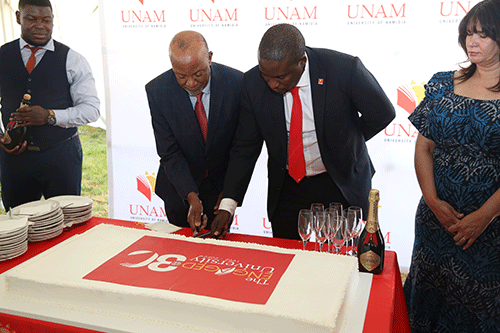The University of Namibia has significantly grown from a staff complement of 147 at its inception in 1992 and now boasts more than 2 500 employees, including 83 academic professors.
The university, which celebrated 30 years yesterday, now has a student population of 28 467, compared to the initial more than 3 000.
Unam vice chancellor Kenneth Matengu yesterday said 90% of the university staff are Namibians, while 10% make up the foreign legion.
“Hence, the public statement that states that Unam favours foreigners is not true because the majority of the academic staff are Namibians,” he said at a celebration event at the main campus in Windhoek. Unam was established through an Act of parliament as Namibia did not have a fully-fledged university on the eve of independence.
Before independence, the Academy for Tertiary Education, which consisted of a university component, a technikon and a college for out of school training, was the biggest tertiary institution in the country.
By 1989, the academy had seven professors, seven associate professors, 24 senior lecturers, 70 lecturers and 21 junior lecturers most of whom were seconded to Namibia from universities in South Africa.
The academy was later dissolved paving way for the University of Namibia and the Namibia University of Technology, which was then known as the Polytechnic of Namibia.
Unam remains the premier institution of tertiary education in the country, with 12 campuses countrywide.
Unam chancellor Nangolo Mbumba indicated the university has over the years grown in leaps and bounds than a few could have imagined.
“It has successfully positioned itself as a leading university, offering quality teaching, growing its research output and making a difference in our communities,” he said.
He added the government support has created a conducive environment for Unam to develop a reputation for championing strategic national initiatives, which is exactly what is expected from a national university.
Mbumba said human resource is a key accomplishment of Unam.
“For instance, I am informed that in 1992, Unam had just over 3 600 students enrollment, this number now averages around 30 000 enrolled students for the past four years. Graduation numbers average around 4 000 per year. I am humbled and inspired to live through these exciting times in Namibia,” said Mbumba.
He reminded the university that it was entering into a new decade that is highly competitive and filled with a great amount of uncertainty caused by pandemics, global conflicts and environmental challenges.
“We must perfect our education system at both basic and higher levels, and our discipline to do high-quality work through stronger collaboration with industry. The private sector has a responsibility to play as well because a skilled competent workforce needs both theory and practice,” he emphasised.
Mbumba, who is also the vice president, added both government and private sector have a role to play in making higher education accessible and fit for purpose.
“I hereby appeal to the private sector to intensify its existing efforts to fund more talented students and important research that benefit the country,” said Mbumba.
ljason@nepc.com.na



